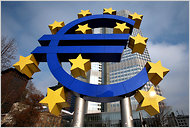 Hannelore Foerster/Bloomberg News
Hannelore Foerster/Bloomberg News
LONDON — European banks must submit their recapitalization plans to their national authorities by Friday as the banks seek to increase their capital reserves by a combined 115 billion euros, or $147 billion.
The deadline, set by the European Banking Authority, is part of regulators’ efforts to strength European institutions’ core Tier 1 ratios, a measure of a bank’s ability to weather financial shocks, to 9 percent by June.
Banks, including Deutsche Bank and Société Générale of France, have until Friday to provide national authorities with guidance on how they expect to raise the extra money. The plans will be reviewed by the banking authority in early February, and authorities have the power to veto any recapitalization strategies they don’t agree with.
On Thursday, Commzerbank of Germany, which must raise 5.3 billion euros by June, said it was more than halfway to meeting the new requirements. The bank expects to raise the remainder through a combination of reducing assets on its balance sheet and retaining future earnings, according to a company statement.
Earlier this month, Grupo Santander of Spain, which must raise 15 billion euros, the largest amount by any European bank, said it had reached its capital target six months ahead of the banking authority’s deadline. The bank, based in Madrid, increased its reserves largely by converting 6.8 billion euros in bonds into shares, retaining profits and selling a stake in its Brazilian unit to an outside investor.
So far, banks have shied away from using capital markets to raise the extra reserves. Many are waiting to see the result of Italian bank Unicredit’s 7.5 billion euro so-called rights offerings, which allows exiting shareholders to buy new stock in a company at a discount. Initially, investors showed little interest in the issuance, but market participants, who were not authorized to talk publicly, say the subscription rate could reach as much as 95 percent when the offering closes at the end of the month.
“Investors believe UniCredit will pull through the crisis,” said an investment banker at a leading firm in Europe, who spoke on condition of anonymity because he was not authorized to talk publicly. “Hedge fund have been building sizable positions in the bank.”
Article source: http://feeds.nytimes.com/click.phdo?i=2ae454bcfcc12ae8cf1ab6233d29b2c9
